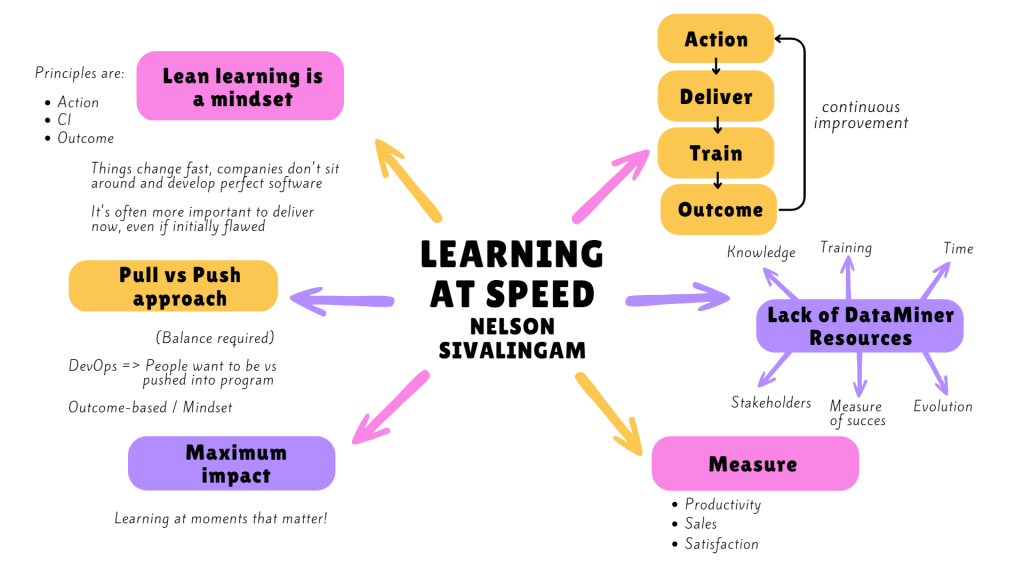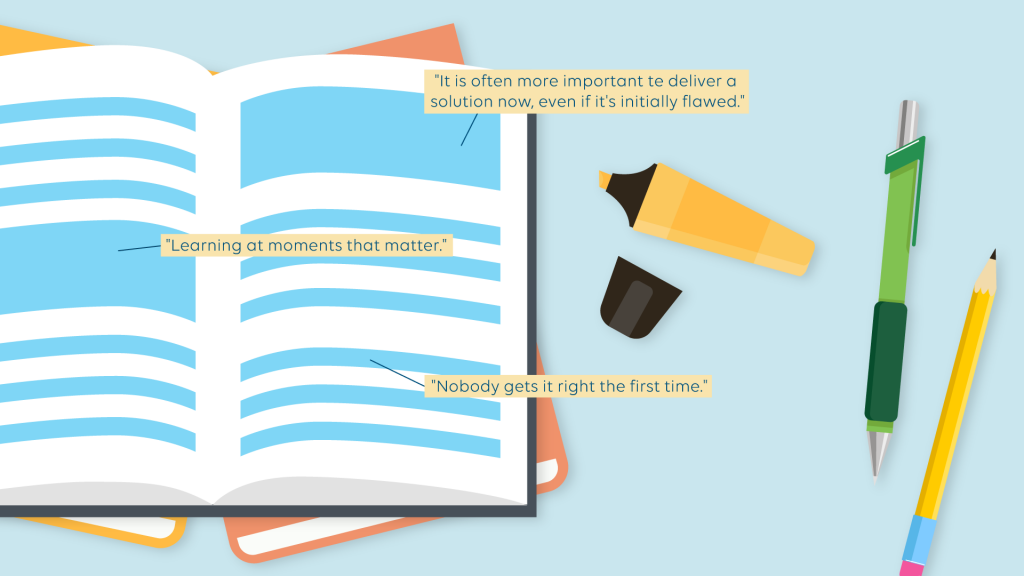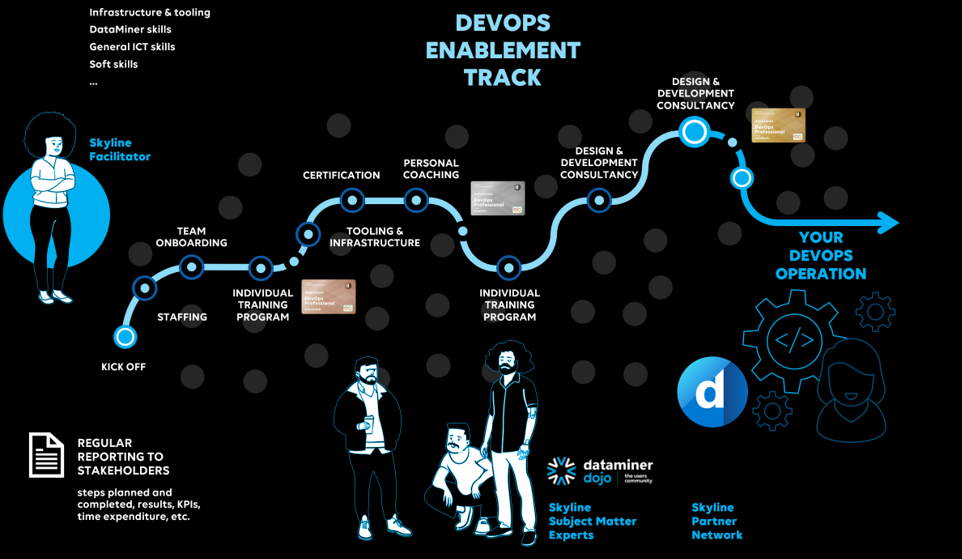Ian Harvey was on his way to Lisbon when he discovered a truly inspiring book: ‘Learning at Speed’ by Nelson Sivalingam. In this blog post, he tells us all about the inspiring ideas he picked up during his flight, and how these are very much applicable to the DataMiner DevOps Enablement Service.
I was on my way to meet with my Skyline colleagues in Lisbon, aboard a flight departing from London Gatwick. The flight time was approximately 2 hours. The local weather at departure could only be described as cold and miserable, with a chance of snow, according to the weather forecast. However, the weather at my destination was said to be dry with a moderate temperature.
After take-off, I stumbled across a book on my tablet called ‘Learning at Speed’ by Nelson Sivalingam. And, WOW…
What should have been a 15-minute read (according to the blinkist app) quickly turned into a whirlwind of ideas related to Learning and Development, which has a direct link to our DataMiner DevOps Enablement Service.
To give you an idea, this is the result of my brainstorming session onboard the plane. Make of it what you will:

In the book, I found a nice quote that stuck with me:
“Things change so fast these days, and companies don’t have time to sit around developing perfectly calibrated, minutely detailed resources.
It is often more important to deliver a solution ‘now’ – even if it’s initially flawed.”
As I read on, it was clear as day that there was a relationship between Learning and Development (L&D) and the mindset when working in a dynamic environment. This is very similar to undertaking a Digital Transformation or to an Agile way of working.
“Nobody gets it right the first time.”
This not only applies to L&D but also to delivering software solutions.
“Learning at moments that matter”
In order to maximize impact and value, learning must be meaningful. The same can be said about the outcome of a software solution. Is the end user receiving value from a platform presented as a ‘new technology’ or ‘cutting-edge design’?
“So, how do you know what the best solution is?
A: The answer is simple: by measuring the outcome.”
“DevOps is a structure that enables people to thrive in an environment they want to be in, in which they are NOT pushed to perform.”

To address the question asked in the quote above: How can we determine what the best solution is? The answer, in essence, is to learn fast and fail quickly. Experience has proven that, regardless of how much time and detail you are willing to submit from the outset, plans will inevitably change along the way in a technology-based environment.
This raises the question: How can your business confidently take its first steps in the search toward a novel or renewed solution?
Good news, there are methods to calculate the required efforts in combination with a person’s mindset. One example below:
1 = low, 10 = high
- Assess the potential impact of the outcome on a scale of 1 to 10.
- Evaluate the level of confidence in the delivery on a scale of 1 to 10.
- Determine the complexity of the solution on a scale of 1 to 10.
- Multiply the ratings from the previous steps to obtain a score out of 1000.
The closer to 1000 you are, the higher the value you are likely to provide to your business with the maximum amount of impact.
The DataMiner DevOps Enablement Service
Now, let’s challenge the mindset of your procurement department.
The book resonated with me because Skyline has recently launched the DataMiner DevOps Enablement Service, aiming to provide knowledge ‘where it matters’, aligned with business objectives to provide the most impact.
The overarching goal is for businesses to become self-sustainable in a DevOps environment with the ability to maintain and evolve platforms independent of contracted third parties.

The digital age has transformed the way we do business. With the amount of data generated and collected every day, businesses need to adapt quickly to stay competitive. The DataMiner DevOps Professional Program is an innovative initiative aimed at empowering individuals and organizations to leverage the transformational power of DataMiner.
DataMiner is a powerful modular tool that enables businesses to extract value from their data. However, it is not enough to have just the tool. You must also understand the specific goals and ambitions of the business to create tangible value. This is where the DataMiner DevOps Enablement Service comes in. The program was designed to create empowered individuals who can work with DataMiner and to deliver value to their businesses.
The program is suitable for any individual or group seeking to master DataMiner as a DevOps tool, to create value, and accelerate their business. The membership levels are designed to create value for the DataMiner community, gain DevOps points, and work your way to one of the three membership levels, each with their own unique set of perks.
To be successful in just about anything in life, commitment is key. The program expects individuals to be committed to their journey towards becoming a DevOps Professional. The program is aimed at empowering the community of DataMiner enthusiasts and DevOps experts across different types of organizations and industry verticals.
The three core levels are:
- Bronze Level: This is the first level of the program. Individuals at this level have access to basic resources and training materials. They can earn DevOps Points by completing training modules and contributing to the DataMiner community.
- Silver Level: This is the second level of the program. Individuals at this level have access to more advanced training materials and resources. They can earn more DevOps Points by completing more advanced training modules and contributing more to the DataMiner community.
- Gold Level: This is the highest level of the program. Individuals at this level have access to all the resources and training materials available. They can earn the most DevOps Points by completing the most advanced training modules and contributing the most to the DataMiner community.
The program also focuses on ensuring that individuals can achieve the highest possible efficiency in converting their limited time into maximum value towards the set goals. This is achieved through the modular nature of DataMiner and the training materials provided in the program.
Great article Ian, truly inspiring! You sparked my curiosity to go read this book 😉
Interesting article. If you like those types of topics, I also recommend to have a look at the ‘5 moments of need’ (https://www.5momentsofneed.com/). I’ll read the book as well!
Ian, great article! Keep writing!
Very interesting read!
Measuring outcome is easier said than done though and estimating the outcome or value of something is even harder, if not impossible (even with the suggested or any other formula you can come up with). That makes it even more important to learn fast.
I read the following in a paper by Daniel Vacanti today and this reminded me of it:
“Further, I would hope I would never say to not use relevant information when making a decision. If you have any reliable information around Cost of Delay”… or any other value metric …”, then you should definitely use it. Even then, however, you will get tremendous benefit from breaking your items up into the smallest possible pieces. Just remember that in contexts where uncertainty dominates less time should be spent in upfront planning and estimation, and more time should be spent in actually doing the work (driving out uncertainty). The ideal is to validate that you have either a winning or losing strategy as quickly as possible and move on to the next thing. Your optimal strategy over the long term is to place as many bets as possible because you don’t know which ones will hit.”
Thanks for sparking my brain, Ian.